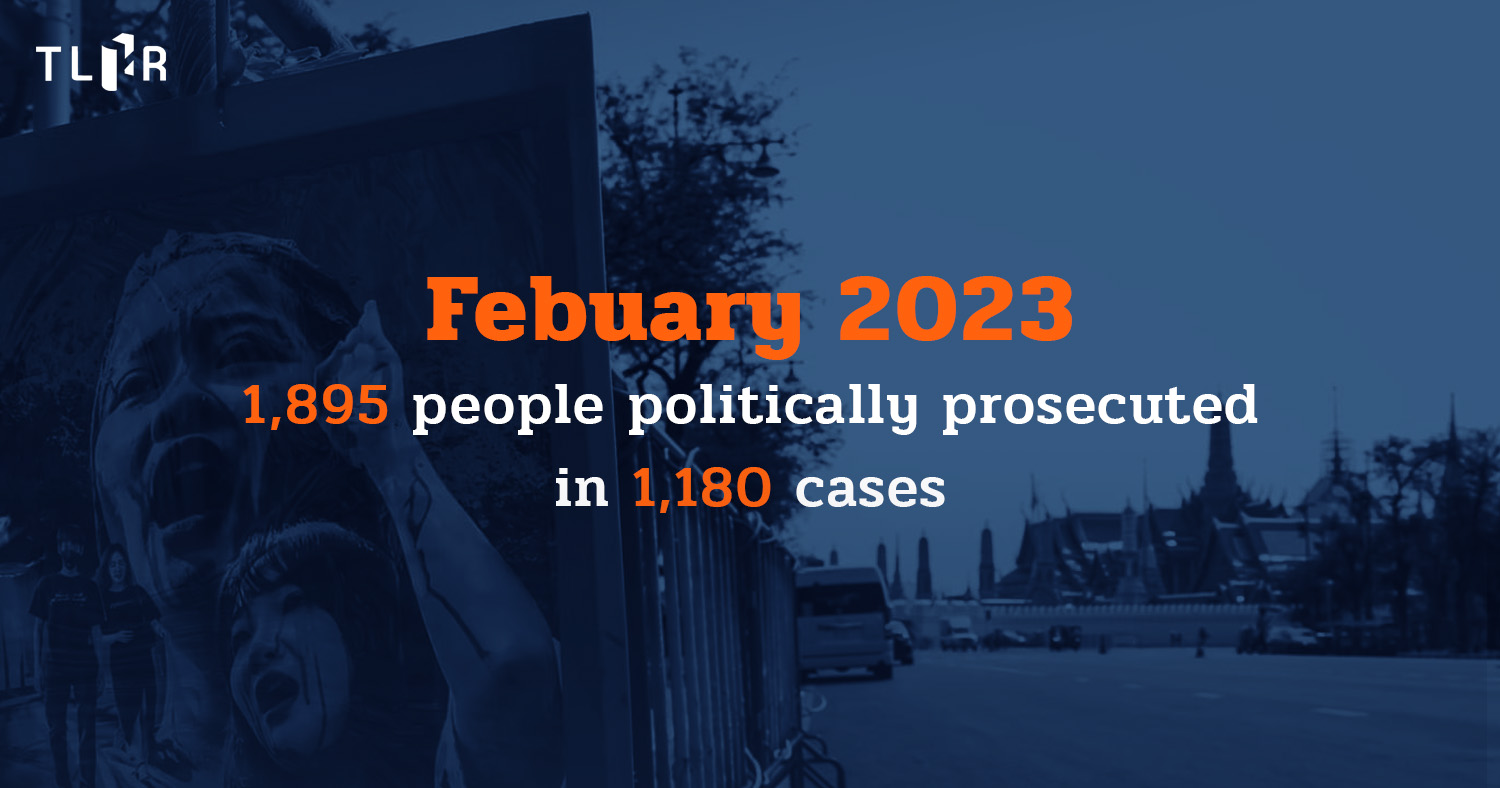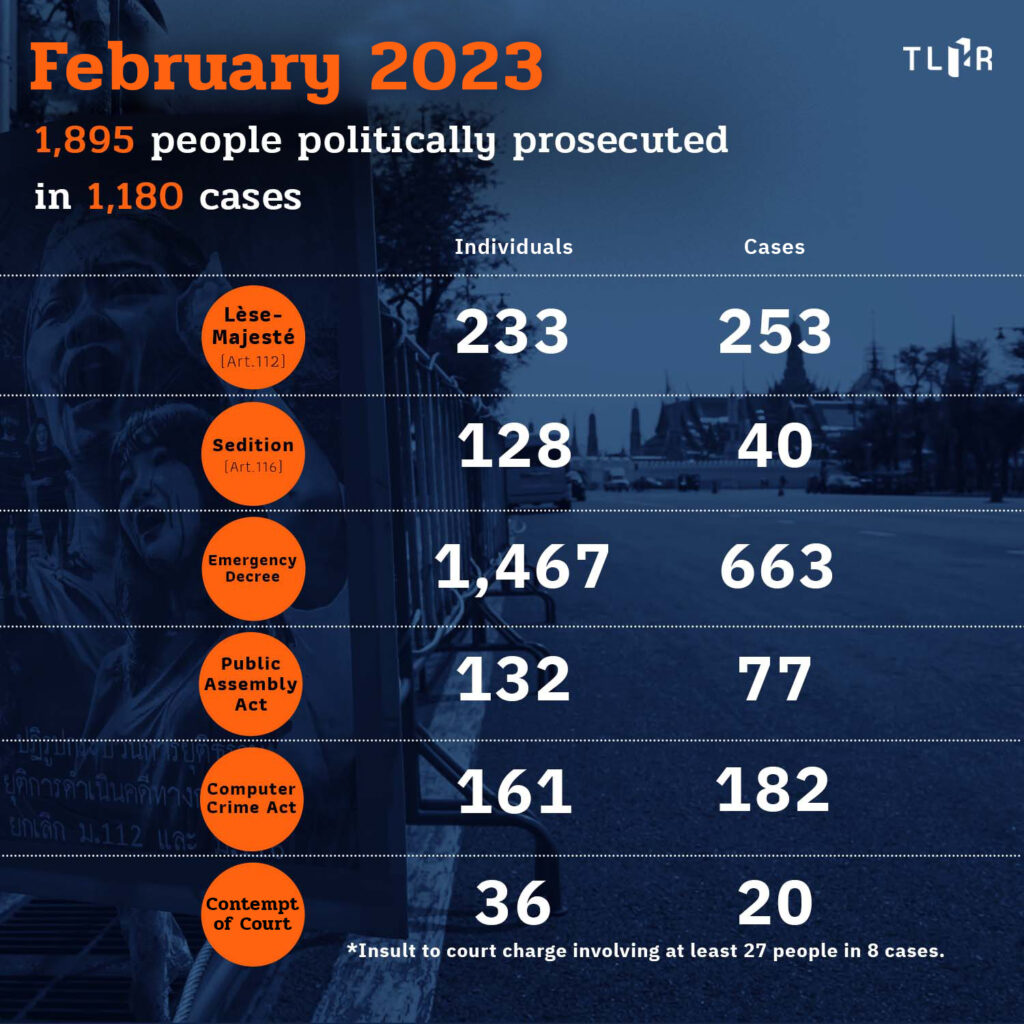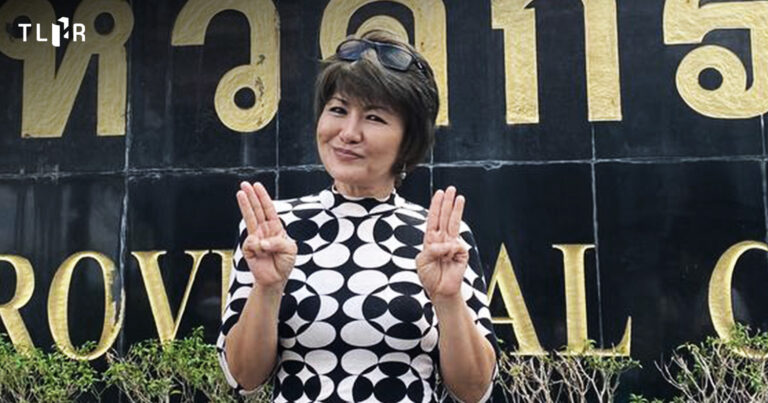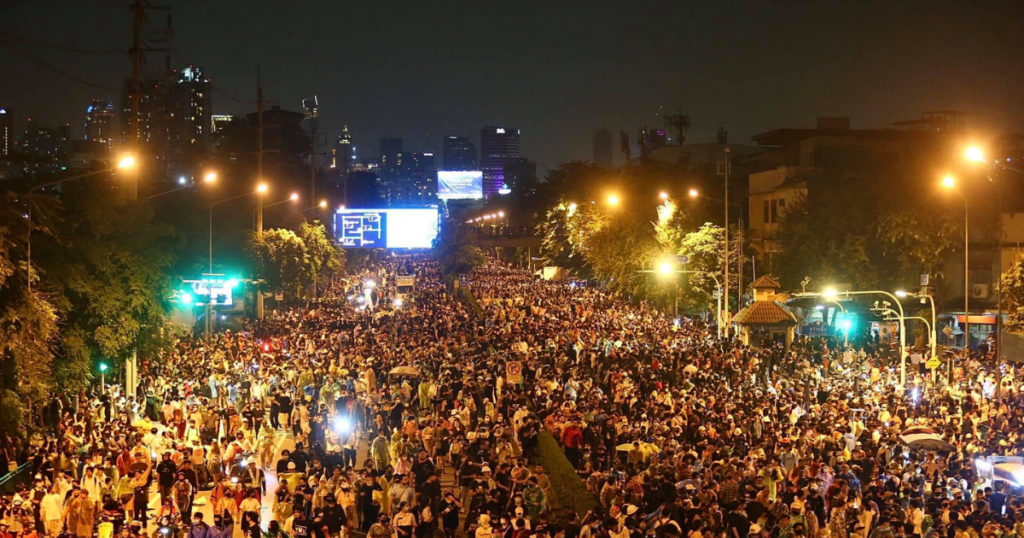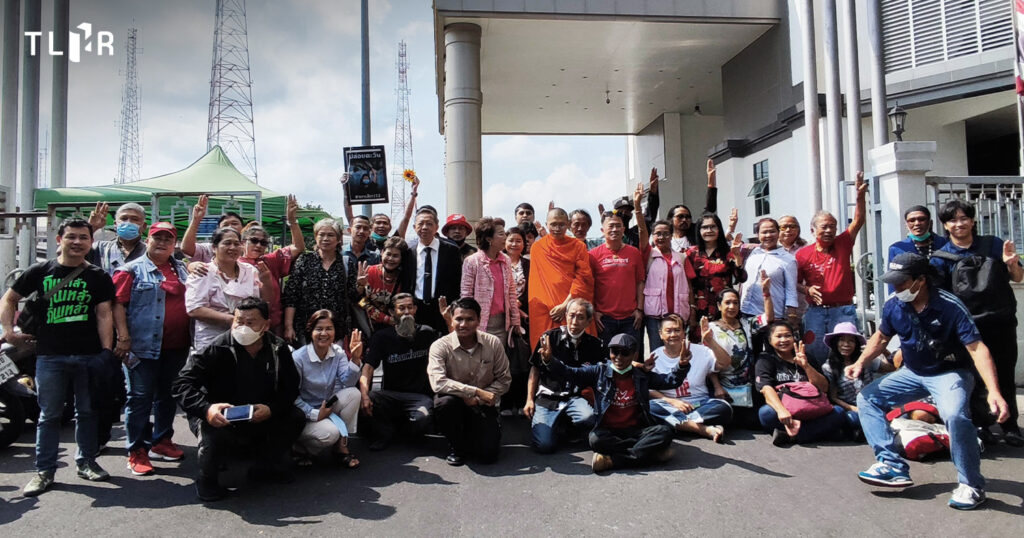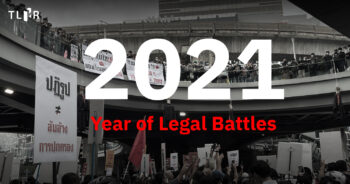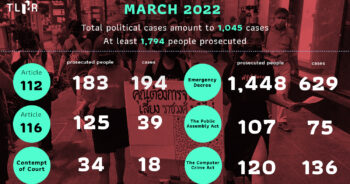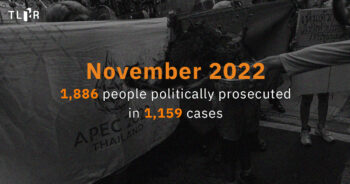Two months into the new year as Thailand is gearing towards a general election, over a hundred cases related to political expression and assemblies are still set to go to trial. In the past month, at least six new lèse-majesté cases have been reportedly initiated, while six cases related to the protests in 2020 – 2021 have been dismissed by the court. Likewise, the case of ‘People Who Want to Vote’, lasting almost five years, has recently ended in an acquittal as well.
According to TLHR statistics, at least 1,895 people in 1,180 cases have been charged and/or prosecuted due to their political participation and expression since the beginning of the “Free Youth” protest on 18 July 2020 until 28 February 2023.
Among this number are 211 cases involving 284 children and youths under 18 years old, including 41 below 15 years old and 243 between 15 – 18 years old.
Compared to the end of January 2023, this month’s statistics saw an increase of 5 people and 11 cases (only counting those who had never been charged before).
If we also count and include those who are being or have been prosecuted in multiple cases, we have found that there would be at least 3,785 instances of prosecution in total.
The prosecution can be grouped according to key charges used, as follows:
1. The royal defamation or “lèse-majesté” charge under Section 112 of the Criminal Code: at least 233 individuals in 253 cases.
2. The “sedition” charge under Section 116 of the Criminal Code: at least 128 individuals in 40 cases.
3. Violation of the Emergency Decree: at least 1,467 people in 663 cases (since May 2020 where the first legal action against political protesters and activists was initiated).
4. Charges under the Public Assembly Act: at least 132 people in 77 cases.
5. Charges under the Computer Crime Act: at least 161 people in 182 cases.
6. Contempt of court charge: at least 36 people in 20 cases and insult to the court charge involving at least 27 people in 8 cases.
Out of these 1,180 cases, 312 have been concluded. Meaning, 868 cases are still ongoing at various stages.
.
.
Key developments in the prosecution trends in February 2023 are as follows:
Lèse-majesté cases increase by 6, many of which were filed in Southern Thailand by a royalist group. Summons have been steadily issued by the police.
As far as we know, five people have been charged in 6 cases under the lèse-majesté law or Section 112 of the Criminal Code last month. A notable case is that of Kanruethai Klai-on, a political activist and protester, who, as she went to hear the charges as per summon warrant at Lad Prao Police Station, learned that she had been accused of a total of eight Facebook posts published in the beginning of 2022. The police then sought her detention from the court before the court granted her bail.
Three cases in the South have also been reported where people received summons in connection with lèse-majesté charge. In all of these cases, the complaints were filed by Songchai Niamhom, member of the King Protection Group, at various police stations in Patthalung and Krabi province. In Donlaporn’s case, for instance, she was summoned by the Muang Krabi Police Station as a witness; however, upon arrival, the police pressed charges against her and had her detained without the presence of a lawyer. Donlaporn was eventually granted bail. In other cases, the other summoned parties have yet to hear their charges.
Last month, the first instance courts have passed verdicts in 4 lèse-majesté cases, including one issued by Krabi Provincial Court acquitting Sureemat. Sureemat was accused of sharing a link to a video clip from the ‘Royalist Marketplace’ Facebook group showing a person performing a ritual to expel Gen Prayuth Chan-o-cha. A member of an opponent royalist group accused Sureemat of lèse-majesté on the grounds that the cover picture of said Facebook group was a picture of King Rama.
Despite the clear lack of intention and elements of the lèse-majesté crime in this case, both police and public prosecutors pressed on with prosecution only for the case to be dismissed by the court in the end. This reflects the problem associated with the useof Section 112 as a political tool.
.
.
One case where the defendant went on trial and was found guilty by the court is that of Sirichai ‘New’, a Thammasat University student accused of spraying with paint the text “Abolish 112” and “My Tax” on a royal portrait in Khlong Luang area, even though the portrait was not of any person who was protected under the lèse-majesté law. Yet, the Thanyaburi Provincial Court held that spraying on a portrait of a member of the royal family had an effect on the King himself, and was considered an act undermining and causing damages to the monarchy. The Court suspended the sentence of imprisonment.
In the other 2 cases, the defendants confessed and the courts issued verdicts without suspending the sentences. One is the second case against Ukrit ‘Kong’, who was sentenced to a two-year prison term. The other case involves Thanaporn, a nursing mother who commented on a post from the page sharing a retouched picture of Kings Rama VIII and IX. In this case, the first instance court’s verdict (i.e., suspended sentence) was modified by the Appeal Court to a sentence of a two-year prison term without suspension. According to the appeal court, during the alleged offense, the defendant was over 21 years old and possessed sufficient maturity. The sentence was therefore not suspended. Defendants in both cases have been granted bail during appeal to the Appeal Court and Supreme Court, respectively.
Amid the ongoing hunger strike and sleep strike by “Tawan – Get – Bam”, the courts granted bail to many people detained during trial, including Ukrit ‘Kong’, ‘Aek’, Sombat Thongyoi, Sitthichoke ‘Tag’, Sophon ‘Get’, ‘Baipor’, as well as ‘Tawan’ and ‘Bam’. Thus, as far as we know, no lèse-majesté detainees are currently in detention during their trials, although some other political detainees are still behind bars.
.
Courts dismissed 6 Emergency Decree cases, including almost all cases related to the “21 October rally to the Victory Monument” case.
In February, there has been one new case related to a political protest. After 25 protesters were arrested and prosecuted during the Citizens Stop APEC2022 protest in November, last month the police of Samran Rat Police Station issued summons to 5 other protesters. The hearing of charges was postponed until later.
A large number of Emergency Decree cases related to the protests between 2020 and 2022 are still ongoing in courts, thus creating burdens for many activists and citizens. Nevertheless, courts have a tendency to acquit the defendants in those cases. In February 2023, the courts dismissed six of these cases, while convicting three cases with mostly a sentence of fine. The exception is the case of Phitsanulok Car Mob, which received a suspended prison sentence.
Notable acquitted cases include a series of cases related to the 21 October rally to the Victory Monument, where the Dusit Kwaeng Court acquitted Piyarat ‘Toto’ Chongthep and Chonthicha ‘Lookkate’ Jangrew. In total, ten cases involving activists, who were prosecuted and went on trials separately, have already been dismissed by the courts, who gave similar reasoning that the act of protest was a constitutional right and not a violation of the Emergency Decree. In none of the cases did the public prosecutor decide to appeal.
In Chonthicha’s case, the public prosecutor declared before the reading of the judgment that the attorney general had allowed the case to be withdrawn as per request filed by the defendant almost a year ago. However, Chonticha insisted on hearing the court’s verdict. Meanwhile, in the series of cases from this protest, only that of Thatchapong ‘Boy’ has yet to start with witness examination.
This situation shows how the “laws”, such as the Emergency Decree, have been used as a political instrument in order to suppress political assemblies and impose burdens and difficulties on political activists in exercising their rights and freedoms. At the same time, institutions within the justice system themselves, including the police, public prosecutors, and court, also contribute to the continuation of this problem in Thai society.
Despite the upcoming general election, at least 537 cases involving political protesters accused of violating the Emergency Decree still exist and are ongoing. Meanwhile, public prosecutors continue to issue indictments or appeal the court’s dismissal of cases.
.
The court acquitted the defendants of the case of ‘People Who Want to Vote’ protest in front of the UN and the case of Dao Din member mockingly dressed as a monk, while the appeal court convicted defendants in three contempt of court cases.
Another interesting verdict in the past month is the acquittal in the case of ‘People Who Want to Vote’ or UN62 protesters in front of the United Nations office in 2019. After five years at court, the Dusit Kwaeng Court finally acquitted the 39 protesters, reasoning that the protest proceeded peacefully without arms, and the protesters were exercising their constitutional right to call for an election and did not create excessive public disturbances.
With respect to the ‘People Who Want to Vote’ cases during the NCPO era, after prolonged trials, the courts dismissed almost all cases and the public prosecutor issued non-indictment orders in those cases. Only one UN62 case involving a protest leader accused of Section 116 as the main charge is still in the process of witness examination. This reflects how lawsuits are used to suppress political assemblies, a tactic regularly used by the coup maker and seen as ‘normal’ in Thai society.
Another case that ended in an acquittal last month was that involving a Dao Din monk, a former Santi Asoke priest who was arrested while performing a hunger strike to protest the denial of bail for political activists in front of the Criminal Court and charged in 3 cases with wearing a costume to mock a Buddhist monk. The Bangkok North Municipal Court issued an order of acquittal in the one of the cases, reasoning that the defendant was merely dressed according to the sect of his belief, lived life openly, and did not deceive anyone. Furthermore, the general public could distinguish his costume from that of a Buddhist monk.
Meanwhile, the Appeal Court passed verdicts affirming the first instance courts’ judgment of conviction for 3 contempt of court cases stemming from the political assemblies and expression during 2021 – 2022. These cases include one involving 5 protesters protesting in front of the Criminal Court on 2 May 2021, one involving 3 protesters protesting in front of the Criminal Court on 24 December 2021, and the other involving 3 Thalu Fah members who wrote and drew on the wall of the arraignment room of the Criminal Court while waiting for the decision on a temporary release on 18 January 2022. That said, the courts insisted on giving an unsuspended sentence of confinement to some of the accused, who planned to appeal further to the Supreme Court.
